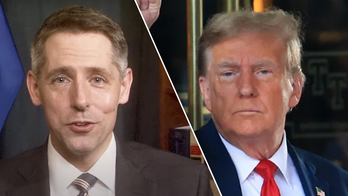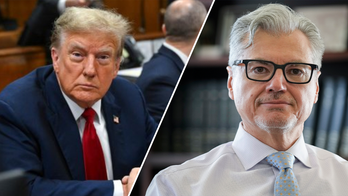CHICAGO – Thousands of protesters marched Sunday outside the NATO summit on Afghanistan, as authorities scrambled to intercept alleged plots against the Chicago gathering and investigate other disruptions.
The protest Sunday afternoon, billed as the largest demonstration tied to the summit, only dealt in part with the Afghanistan war. Activists took to the streets to protest everything from climate change to the Keystone pipeline to anti-union policies.
Protesters were seen clashing with dozens of Chicago police wearing riot gear near the site of the NATO summit.
A large crowd of protesters pushed against a line of Chicago police that was six officers deep at some points. Some of the officers were striking out at the crowd with batons. Members of the crowd threw large sticks, liquids and bottles at the police. Several protesters wore bandannas over their faces.
Police were pulling individual protesters out of the crowd, handcuffing them and carrying them away by their limbs. At least one protester had blood on the left side of his head.
Chicago Police Superintendent Garry McCarthy was standing behind his officers shouting orders.
The confrontation then started to calm down, with police announcing over a loudspeaker: "Attention. Attention. This is the Chicago Police Dept. Please continue to disperse to the west."
Most protesters left the area, while a small number had been detained.
The clash came at the end of a march nearly three-hour protest march that was largely peaceful. At the end of the march, several speakers including the Rev. Jesse Jackson also asked the protesters to peacefully disperse.
Earlier in the march, dozens of protesters in black clothing surged toward a much smaller group of police, throwing objects at them.
The badly outnumbered officers fought back with truncheons, and people on both sides threw punches. As police reinforcements moved in, the pack of violent protesters fled.
That march was only one piece of the dizzying set of challenges law enforcement were dealing with as they policed the international gathering. Two more individuals were arrested over the weekend and accused of threatening the NATO conference in Chicago, bringing the total number to five. Hacker group Anonymous was also reportedly claiming responsibility for a disruption to the city of Chicago's website.
Despite the early challenges, President Obama met as scheduled Sunday with Afghan President Hamid Karzai at summit headquarters, before heading into meetings with top NATO officials on the way forward in Afghanistan.
The latest arrests and heavy police presence were used as a rallying cry by demonstrators Sunday, as lead protester Andy Thayer called on Obama to call off the cops.
"We are holding you, President Obama and Mayor (Rahm) Emanuel personally responsible for any violence," he said. "If you value the election this November, you'll tell your officers to stand down."
Prosecutors previously charged three men with planning to attack Obama's campaign headquarters, Emanuel's home and other targets. They're accused of trying to make Molotov cocktails.
Two more alleged plotters, Sebastian Senakiewicz and Mark Neiweem, have also been charged. The Cook County State's Attorney's office said in a statement Sunday that Neiweem, 28, is charged with attempted possession of explosives or incendiary devices and Sebastian Senakiewicz, 24, is charged with falsely making a terrorist threat.
Police Supt. Garry McCarthy earlier said the cases of all five individuals are connected, though a statement from the Cook County State's Attorney's office said the latest arrests merely "arose from related investigations."
"The two defendants are not charged with any involvement in the terrorist case from yesterday, and today's cases are separate matters," the statement said.
In addition, officials were investigating after the websites for the city of Chicago and its police department stopped working. A group that calls itself Anonymous posted a statement claiming to have taken the police site out of commission as the NATO summit began Sunday.
Officials have not yet confirmed whether the incident is a cyber attack.
Increasingly tense clashes Saturday night tested police, who used bicycles to barricade streets and horseback officers to coax them in different directions. Eighteen people were arrested, McCarthy said.
Organizers of Sunday's rally had initially predicted tens of thousands of protesters this weekend.
But that was when the G-8 summit also was scheduled to be in Chicago. Earlier this year, Obama moved the Group of 8 economic meeting to Camp David, the secluded retreat in rural Maryland.
Chicago kept the NATO summit, which will focus on the war in Afghanistan and other international security matters, but not the economy. That left activists with the challenge of persuading groups as diverse as teachers, nurses and union laborers to show up for the Chicago protests even though the summit's main focus doesn't align with their most heartfelt issues.
"I'm here to protest NATO, which I feel is the enforcement arm of the ruling 1 percent -- of the capitalist 1 percent," said protester John Schraufnagel, 53, who took a bus from Minneapolis to Chicago and was among the first demonstrators to gather at Grant Park Sunday.
Sunday's protest followed several, smaller demonstrations the previous two days including one peaceful march to the home of Emanuel, Obama's former chief of staff, on Saturday. But a march later that evening involving hundreds of demonstrators stretched for hours as protesters zigzagged back and forth through downtown, some decrying terrorism-related charges leveled against three young men earlier in the day.
McCarthy said police would be ready with quick but targeted arrests of any demonstrators who turn violent Sunday.
"If anything else happens, the plan is to go in and get the people who create the violent acts, take them out of the crowd and arrest them," warned McCarthy. "We're not going to charge the crowd wholesale -- that's the bottom line."
Security has been tight throughout the city. As police gathered en masse on streetcorners, near parks and key landmarks, the city's streets remained largely vacant and many downtown buildings closed.
The Associated Press contributed to this report.





